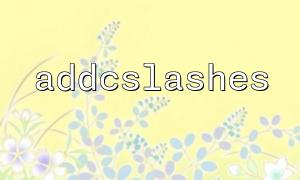In PHP, the addcslashes function is used to add backslash escape characters to a string. This helps us handle characters that require escaping, such as quotes and special characters. Particularly in regex matching and replacement, the addcslashes function can work with regular expressions to achieve more complex escaping needs.
The addcslashes function escapes specific characters in a string. Its basic syntax is as follows:
<span><span><span class="hljs-keyword">string</span></span><span> </span><span><span class="hljs-title function_ invoke__">addcslashes</span></span><span> ( </span><span><span class="hljs-keyword">string</span></span><span> </span><span><span class="hljs-variable">$str</span></span><span> , </span><span><span class="hljs-keyword">string</span></span><span> </span><span><span class="hljs-variable">$charlist</span></span><span> )
</span></span>$str: The string to be processed.
$charlist: The range of characters to escape.
For example:
<span><span><span class="hljs-variable">$string</span></span><span> = </span><span><span class="hljs-string">"Hello, World!"</span></span><span>;
</span><span><span class="hljs-variable">$escaped</span></span><span> = </span><span><span class="hljs-title function_ invoke__">addcslashes</span></span><span>(</span><span><span class="hljs-variable">$string</span></span><span>, </span><span><span class="hljs-string">'A..Z'</span></span><span>);
</span><span><span class="hljs-keyword">echo</span><span> </span><span><span class="hljs-variable">$escaped</span></span>; </span><span><span class="hljs-comment">// Output: Hello, \World!</span></span><span>
</span></span>In this example, we add a backslash before all uppercase letters (A..Z) to escape them.
In regular expressions, some characters (such as the dot ., parentheses (), asterisk *, etc.) have special meanings. If we want to match these characters literally, they must be escaped with a backslash. For example, the addcslashes function can help us escape these characters so they appear as normal characters in regex.
Suppose we have a string containing regex special characters and want to escape them to prevent them from being treated as regex tokens. We can use addcslashes to do this:
<span><span><span class="hljs-variable">$string</span></span><span> = </span><span><span class="hljs-string">"hello.world?"</span></span><span>;
</span><span><span class="hljs-variable">$escaped</span></span><span> = </span><span><span class="hljs-title function_ invoke__">addcslashes</span></span><span>(</span><span><span class="hljs-variable">$string</span></span><span>, </span><span><span class="hljs-string">'.?'</span></span><span>);
</span><span><span class="hljs-keyword">echo</span><span> </span><span><span class="hljs-variable">$escaped</span></span>; </span><span><span class="hljs-comment">// Output: hello\.world\?</span></span><span>
</span></span>In the above example, addcslashes escapes the dot (.) and question mark (?) characters, so they no longer have special meaning in regex.
When handling dynamically generated regex patterns, addcslashes is very useful for escaping, ensuring that special characters in strings are correctly handled. For instance, if a user input for search keywords includes regex special characters, we can escape them using addcslashes:
<span><span><span class="hljs-variable">$search</span></span><span> = </span><span><span class="hljs-string">"a+b"</span></span><span>;
</span><span><span class="hljs-variable">$escapedSearch</span></span><span> = </span><span><span class="hljs-title function_ invoke__">addcslashes</span></span><span>(</span><span><span class="hljs-variable">$search</span></span><span>, </span><span><span class="hljs-string">'.*+?^${}()|\[]/'</span></span><span>); </span><span><span class="hljs-comment">// Escape regex special characters</span></span><span>
</span><span><span class="hljs-variable">$pattern</span></span><span> = </span><span><span class="hljs-string">"/<span class="hljs-subst">$escapedSearch</span>/";</span></span><span>
</span><span><span class="hljs-keyword">echo</span><span> </span><span><span class="hljs-variable">$pattern</span></span>; </span><span><span class="hljs-comment">// Output: /a\+b/</span></span><span>
</span></span>This way, we ensure that user input strings won't cause unexpected behavior when used in regex matching.
Sometimes, we need to use the addcslashes function in regex replacement operations to achieve complex escaping. For example, we want to replace all special characters in a string while maintaining their escaped state:
<span><span><span class="hljs-variable">$string</span></span><span> = </span><span><span class="hljs-string">"a+b = c*d"</span></span><span>;
</span><span><span class="hljs-variable">$escaped</span></span><span> = </span><span><span class="hljs-title function_ invoke__">addcslashes</span></span><span>(</span><span><span class="hljs-variable">$string</span></span><span>, </span><span><span class="hljs-string">'.*+?^${}()|\[]/'</span></span><span>);
</span><span><span class="hljs-variable">$pattern</span></span><span> = </span><span><span class="hljs-string">"/([a-zA-Z])/"</span></span>; </span><span><span class="hljs-comment">// Match letters</span></span><span>
</span><span><span class="hljs-variable">$replacement</span></span><span> = </span><span><span class="hljs-string">"\\1"</span></span>; </span><span><span class="hljs-comment">// Replace with the letter itself</span></span><span>
<p></span>$result = preg_replace($pattern, </span>$replacement, </span>$escaped);<br>
</span>echo $result; // Output: a+b = c*d<br>
</span>In this example, we first escape the original string with addcslashes, then use preg_replace to replace the letters, ensuring the replacement does not interfere with the already escaped special characters.
addcslashes combined with regular expressions greatly enhances our ability to handle special characters in strings. When escaping characters, avoiding regex conflicts, or performing complex replacements, addcslashes is a very practical tool. By using this function flexibly, we can efficiently process strings and regular expressions in PHP.
Related Tags:
addcslashes



